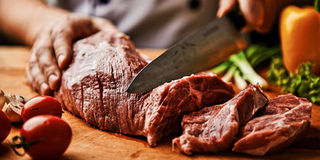How not to let anyone take advantage of your love for meat
Sponsored by State Department for Livestock

Uninspected meat from sick and dying animals is being sold in butcheries, eateries, and schools, posing severe health risks.
By Dr Daniel Muasya
On road trips to rural countryside from Nairobi, you gradually transition from the challenge of navigating traffic alongside aggressive commuter van drivers and antagonistic motorcyclists (matatus and boda bodas), to watching out for livestock that might appear on the road without notice.
Making a stopover along the way to enjoy the picturesque landscapes, you are quickly greeted with the irresistible aroma of meat snacks like beef skewers, sausages, and samosas, at the roadside eateries.
You grab enough for the crew and jump back into the car after taking some selfies. The price is higher than usual, but you console yourselves that the snacks are exceptionally yummy and worth the cost.
It is late lunch by the time you arrive at the rural township, so hungry and tired, with everyone in agreement that a nicely done and tender nyama choma is the most appropriate reward for making it through the trip without a regrettable incident.
As you select the beef cuts on the grill, the barbecue chef boasts of their special marinating recipe that will make you a regular client. Indeed, this becomes a habit during your stay upcountry. Meat remains a constant, the only difference being the type; whether beef, goat meat, chicken, mutton, or fish.
Returning to the city, you make a stop somewhere and buy live chicken to later slaughter and keep in your deep freezer at home.
Many people in the middle income segment, especially in urban areas, consume meat quite often, if not daily. This demand is largely fulfilled by small-scale farmers upcountry, where keeping cattle, goats, sheep, pigs, and chicken is a common source of income.
Livestock and meat trade holds profound importance for the poor farmers, offering a pathway to improved livelihoods and economic stability. By selling their animals for meat once in a while when needs arise, these farmers are able to meet important needs.
You will often hear accounts of how a neighbour back home sold a favourite bull or goat to the village butcher to pay fees for their child to complete high school.
So, as you enjoy your kuku choma (roast chicken) served with ugali (maize meal) and kachumbari (tomato and onion salad), you are not only taking care of your nutrition but also stimulating economic growth of livestock farmers in different parts of the country.
The livestock industry is wide and far reaching in both rural and urban set-ups. Many of us likely know or are related to someone in meat business, or public health inspection, or livestock health. It is a very important industry, supporting many livelihoods – from farmers to transporters, slaughter house workers, butchers, restaurant workers and owners, and dealers in animal by-products.
Meat is a favourite dish for many Kenyans. Whether frequently accessible or not, the desire is constant. Everywhere, especially during meals times, the pleasant aroma of barbecue or sizzling wet fry will whet your appetite intensely.
Caution though. Due to the presence of unscrupulous meat traders, it would be understandable if you entertained the following thoughts as you wait to savour the nyama choma you have just ordered by the roadside: Did some corrupt trader secretly slaughter a wild animal and brought the meat here? Is the meat free of chemical residues? Did someone slaughter a sick, dying cow?
These valid concerns should alert everyone to be watchful and stick to outlets known to serve quality. By all means, avoid cheap meat products or cutting corners.
We can win against the threats posed by unscrupulous traders if we ensure we source meat and meat products from reputable dealers and confirm public health inspection before purchase.
____________________
Dr Daniel Muasya, PhD, is a lecturer at the Department of Clinical Studies, University of Nairobi (Email: [email protected])


